by Rafaël Newman
 The National Library of Kosovo is perched above downtown Prishtina. Built in the early 1980s and now with holdings of some two million, the complex resembles a mashup of Moshe Safdie’s Habitat with a flying squadron of geodesic domes, the whole unaccountably draped in chainmail. During the war in Kosovo in the late 1990s, the building served as a command center for the Yugoslav Army, which destroyed or damaged much of its collection of Albanian-language literature; the Library’s refurbishment and maintenance today thus signals the young Republic’s will to preserve and celebrate its culture.
The National Library of Kosovo is perched above downtown Prishtina. Built in the early 1980s and now with holdings of some two million, the complex resembles a mashup of Moshe Safdie’s Habitat with a flying squadron of geodesic domes, the whole unaccountably draped in chainmail. During the war in Kosovo in the late 1990s, the building served as a command center for the Yugoslav Army, which destroyed or damaged much of its collection of Albanian-language literature; the Library’s refurbishment and maintenance today thus signals the young Republic’s will to preserve and celebrate its culture.
 Reverence for that culture—Albanian culture in general, not limited to the borders of contemporary Kosovo—is on egregious display throughout Prishtina. The library looks across at the Cathedral of Saint Mother Teresa, erected in honor of the Skopje-born Albanian nun in the postwar period; her statue and a square bearing her name can also be found further north, on Bulevardi Nënë Tereza.
Reverence for that culture—Albanian culture in general, not limited to the borders of contemporary Kosovo—is on egregious display throughout Prishtina. The library looks across at the Cathedral of Saint Mother Teresa, erected in honor of the Skopje-born Albanian nun in the postwar period; her statue and a square bearing her name can also be found further north, on Bulevardi Nënë Tereza.
 Mother Teresa Boulevard ends in a broad piazza in which Skanderbeg (or Skënderbeu), the nom de guerre of Gjergj Kastrioti, the 15th-century hero of Albanian resistance to Ottoman rule, faces a statue of Ibrahim Rugova, the Kosovo-Albanian man of letters who served as the Republic’s first president during the 1990s and until his death in 2006. The piazza also features an homage to Adem Jashari, a founding member of the UÇK whose martyrdom at the hands of Serbian police, along with 57 members of his family at their home in Prekaz in 1998, is commemorated with a national memorial site, while his name has been bestowed on Prishtina’s airport and other notable institutions.
Mother Teresa Boulevard ends in a broad piazza in which Skanderbeg (or Skënderbeu), the nom de guerre of Gjergj Kastrioti, the 15th-century hero of Albanian resistance to Ottoman rule, faces a statue of Ibrahim Rugova, the Kosovo-Albanian man of letters who served as the Republic’s first president during the 1990s and until his death in 2006. The piazza also features an homage to Adem Jashari, a founding member of the UÇK whose martyrdom at the hands of Serbian police, along with 57 members of his family at their home in Prekaz in 1998, is commemorated with a national memorial site, while his name has been bestowed on Prishtina’s airport and other notable institutions.

Farther down, a large portrait of Hashim Thaçi, the leader of the UÇK (Kosovo Liberation Army) in the war with Serbia, adorns a building facing the boulevard. Prishtina also features public likenesses of Bob Dole and Madeleine Albright, and streets named for Wesley Clark and Tony Blair. And there is of course Bill Clinton, under whose aegis NATO bombs drove Serbian forces out of Kosovo in 1999 and led to the establishment of the Republic. The US President’s statue, positioned slightly outside the downtown core but not far from the Cathedral and the Library, features an outstretched arm à la Lenin that ends, however, with an amicably waving hand rather than an imperious index finger.
Thus, although it has avoided the idolatrous excesses of Skopje, the capital of North Macedonia, which is so populated by statues that it is reminiscent of Sleeping Beauty’s petrified court, Prishtina does feel rather like an assembly of Stone Guests—although Prishtina’s tributes to Albanian folk heroes stand alongside American counterparts, rather than the Slavic heroes immortalized in Skopje.
The war in Kosovo, between its Albanian population and Serbian forces intent on keeping what had been the Autonomous Yugoslav Province, ended in 1999, but it wasn’t until 2008 that the Republic of Kosovo declared its independence. Ten years after that, the young Kosovar poet and publicist Vlora Ademi, using her own funds and only later supported by local government and the state, founded REPUBLIKA, a festival of Albanian-language arts and letters held annually on or around February 17, the date of Kosovo’s declaration.
I met Vlora in 2019 in Pejë, in northern Kosovo, where we were both attending the Azem Shkreli Literary Festival, an event named in honor of a revered Yugoslavian writer. Two years later, in 2021, Vlora invited me to join other poetë ndërkombëtarë (“international poets,” i.e. non-Albanians) at that year’s edition of REPUBLIKA, and when I had to decline, she took a rain check. Two weeks ago, from February 14 to 16, I was at last able to attend the event, held in Prishtina, for the seventh edition of the festival and the 17th anniversary of Kosovar independence.
It was my second visit to Kosovo and my third to the Albanian world—or perhaps my fourth, if you count my attendance at a PEN International conference on minority languages in North Macedonia in 2007. There, on the shores of Lake Ohrid, I met Entela Kasi, the president of Albanian PEN, who had come with a delegation of Albanian-speakers from Shqipëria (as the country is known to its inhabitants), from Kosovo, and from the host country itself. (Entela, who would go on to translate some of my poems into Albanian, initiated me properly into the Albanian literary circuit when she invited me to the Azem Shkreli Festival in 2019 and, last year, to an event in Albania itself.) At the time in North Macedonia, where there is a sizable ethnic Albanian community and whose capital, Skopje, today features among its many historicizing statues a tribute to Skanderbeg, there were palpable anxieties among the Slavic majority about a putative scheme to create a Greater (or “Ethnic”) Albania, encompassing not only Albania and Kosovo but also a swathe of North Macedonian territory, among other claims.
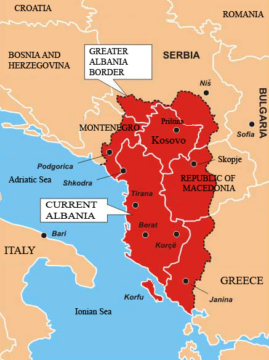 But there were, as far as I could tell, no such irredentist plans afoot last week at Kino Armata, REPUBLIKA’s venue just off Mother Teresa Square, where our time was spent reciting poetry, listening to live music, and attending a book launch, a podium discussion, and a ballet performance. The event was capped by the official celebration of Kosovar independence, with a military parade through the center of the capital, underscoring the small country’s claim to a separate, individual presence on the geopolitical stage.
But there were, as far as I could tell, no such irredentist plans afoot last week at Kino Armata, REPUBLIKA’s venue just off Mother Teresa Square, where our time was spent reciting poetry, listening to live music, and attending a book launch, a podium discussion, and a ballet performance. The event was capped by the official celebration of Kosovar independence, with a military parade through the center of the capital, underscoring the small country’s claim to a separate, individual presence on the geopolitical stage.
The city’s main boulevard had been decorated with Kosovo’s flag, which features its silhouette in yellow against a blue ground and is emblazoned with six stars, one for each of the country’s major ethnic groups (Albanians, Serbs, Bosniaks, Turks, Romani, and Gorani):
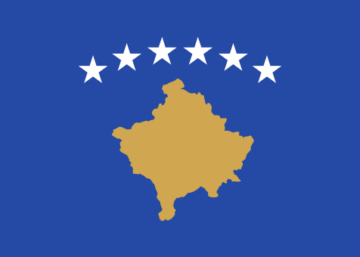
The heraldic aim is clearly to evoke the European Union, to which Kosovo has fond, if distant, aspirations, as well as to stress its having overcome the murderous internecine chauvinism out of which the Republic arose.
The event that opened REPUBLIKA 7, however, as well as the bold, black-on-red, two-headed Albanian eagle that hung prominently alongside the milder Kosovar flag along the city’s streets, complicated this relatively straightforward assertion of a modern, post-ethnonationalist state:
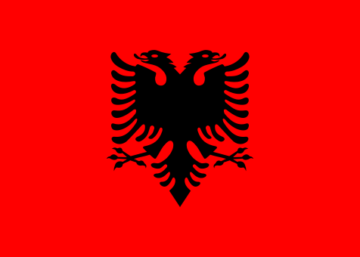
On Friday afternoon we were treated to the premiere of Kufiri i kuq: T’huej mes t’vetve (“The Red Border: Strangers Among Their Own”), a new documentary about relations between Enver Hoxha’s Albania and the Autonomous Yugoslav Province of Kosovo from the 1940s until the 1980s. “The Red Border” refers to the impermeable intellectual boundary between the two ethnic Albanian territories during the Cold War, a boundary that persists, in its physical form, to this day, as Kosovars and Albanians must go through customs to visit each other’s countries. The film, which was produced by the British Council, the Online Archive of Victims of Communism, and by Vlora herself, with Social Creativity, the NGO she directs, is thus premised on the idea of one people separated by artificial ideological borders—an idea clearly available for exploitation by ethno-nationalist ideologues.
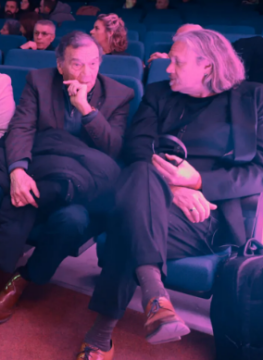
The eminent writer and academic Primo Shllaku, born in 1947 in Shkodër in Northern Albania, appears in the documentary to offer his account of the enforced separation of the related populations of Kosovo and his Albanian homeland. In the film, Shllaku, who was also in attendance at REPUBLIKA and whose latest collection of short stories was launched during the festival, offers a telling formulation of the situation: whereas Albanians under the extreme isolationist Hoxha (1908-1985) had suffered from the rigors of totalitarian communism, their counterparts in Yugoslavia, under Tito (1892-1980) and then under Slobodan Milošević (1941-2006), had been sold out by Hoxha to the Slavic majority in Yugoslavia and subjected to what Shllaku refers to as “Slavism”—thus subtly but distinctly emphasizing the intersectional primacy of ethnicity over politics. And although my colleagues at REPUBLIKA were cultured and worldly, I learned from conversations after the screening that some of them had also welcomed the double-eagled Albanian national bunting on the streets outside the festival venue, thus implicitly supporting the project of transnational ethnic union.
So it was with a certain trepidation that I mounted the festival stage myself that evening, to read some work of my own, since the text I had prepared for presentation, I thought, might well offend these sensibilities. With Vlora’s invitation had come a request for two poems, one to be read by me, in English, the other, in Albanian translation, by an actor. But I had had trouble, from my home in Switzerland, imagining the venue and the audience in Prishtina, so I had provided Vlora with four recent pieces, all of which seemed possibly appropriate to the occasion—the celebration of the modern instantiation of an ancient homeland—and asked her to help me choose.
The texts I sent Vlora were a sonnet, written for my late father, about the persistence of antique tribal language in modern idiosyncratic diction; a prose poem in which contemporary disaster becomes an index of private vicissitudes; a parodic sequence of ventriloquized canonical poets responding to modern technology; and a long ballad, my most recent “New Year’s Eve Toast,” excoriating the murderous national “leaders” currently keeping the world at war.
To my surprise, Vlora chose this last poem, potentially the most provocative and certainly the least obviously laudatory, and suggested that I share its presentation with the actor, alternating strophes in English and Albanian; and when I learned that the translation had been prepared by Primo Shllaku, whom the attendees routinely and reverently referred to as “Maestro,” this served as a further earnest of approval for the text’s politics. I remained nervous about its reception nonetheless. After all, the streets of Prishtina had not only been ornamented for the weekend with national flags: they are also permanently lined with all of those statues and murals of leaders, most of them renowned as warriors. Indeed, as we conferred at Kino Armata, Skanderbeg’s equestrian monument on the piazza at the end of Mother Teresa Boulevard was being augmented with a stage in preparation for the official Independence Day exercises on Monday, thus centering contemporary attention on an avatar of pan-Albanian pride almost as ancient as nearby Kosovo Field, where the Battle of Kosovo was fought between Lazar of Serbia and the Ottoman forces led by Murad I in 1389 and which remains a focus of Serbian irredentism.
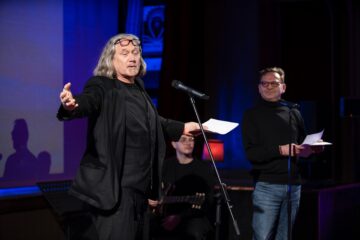
In the event, however, my anarchist protest at demagogues waging murderous war on specious ideological pretext—“And thus my prayer: deliver us, dear readers, / Out of the hands of all our bloody leaders!”—was well received on Friday evening at Kino Armata. I read it in alternation with the actor, Xhevdet Doda, whose fiery declamation of Shllaku’s Albanian version surely left no doubt about the poem’s polemical intent. “One For All—& Solferino!” ironically calls for today’s cowardly autocrats to emulate the Emperors at Solferino, the last to personally lead their troops on a major battlefield—or rather, to go those European warlords one better, by settling their personal differences in single combat, without risking any soldiers’ lives:
Let Vladimir Vladimirovich meet
Mark Rutte in a dead and final heat—
The latter, if he likes, with von der Leyen,
For balance, and for bank, and local buy-in;
As for the former, should he need a boon
Companion, he can cozen Kim Jong Un.
Let Netanyahu call out Khamenei
(With Assad seconding, by Zoom relay);
Let Trump lead Xi and Trudeau, Musk and Vance
A merry MAGA trade-war Totentanz…
Perhaps no objection was likely, from ethnic Albanians, to my reviling Putin (“Vladimir Vladimirovich”), the sometime champion of Serbian hegemony, who had explicitly used the NATO bombardment of Yugoslavia as an excuse for his invasion of Ukraine; and perhaps it was unsurprising that a majority Muslim country would welcome my contempt for Netanyahu. But Trump, Musk, and Vance? How could I expect an audience, however sophisticated, in this most USA-philic of countries to join me in consigning the American troika to plague-ridden oblivion? And yet join me they did: they cheered our delivery, and later kindly allowed me to recite a second poem, my sonnet for my father, at Ulpiana, one of the precious archeological vestiges of early Albanian settlement.
It took a visit to the National Library on Saturday for me to understand the audience’s unexpected approval for my jibe at America. The Library seemed darkened and deserted as I approached it, and I was prepared to find its chainmailed portcullis raised; but they were evidently open for business, and I was able to enter the circular atrium, with access to the reading rooms and stacks. Then I noticed, to my right off the vestibule, illuminated and staffed by a librarian, the “American Corner,” with computers, desks for individual study, a small collection of English-language periodicals—and a prominently displayed placard announcing the Library’s gratitude, for its financing, to USAID.
So it was no wonder that my otherwise pro-American friends and colleagues in Prishtina were happy to second my disdain for Trump, Musk, and Vance, the destroyers of USAID, among so much else. This despite Trump’s avowed championing of ethno-nationalist projects, with his farcically coldhearted plans for Gaza, as well as with his ridiculous ambitions for the annexation of the Canada of my birth, which frankly echoes Putin’s claim to Ukraine: both specious agendas premised on the alleged need for peoples sharing a linguistic heritage to cohabit in the same polity—the very idea behind Greater Albania.
Yes, I realized, my Kosovar colleagues had indeed been led, into and in war, by the very personality type my poem rejects; but that war had been waged, as far as they were concerned, for the preservation not only of their actual lives—many of them had been young adults during the conflict—but of their traditional way of life, which in Prishtina means, principally, poetry and the arts. And if they were now being effectively abandoned to their fate, to the rapacity of Putin’s proxies, by the same allies who had helped them establish a home for those arts—well, they were more intent than ever on celebrating their culture, and on joining me in my prayer: that the world’s “bloody leaders” go out and wage war against each other, without involving their “peoples,” and that they allow us to live in peace, and to flourish in our various cultural pursuits:
Leave them, who’ve borne their admirals’ abuses,
To guidance rather by nine gracious Muses;
Let them be spared the dreadful, death-bound draft,
And turn their hand instead to vital craft.
____________________________________
With renewed thanks to Vlora Ademi, Primo Shllaku, Xhevdet Doda, and the many attendees at REPUBLIKA 7 for informative exchanges and a heartwarming reception.
